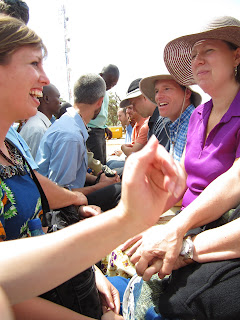The man’s chest is bulging to one
side abnormally. Walking on the outside of his feet, he hobbles up the path towards us as
he slurs out a greeting. I look at Marie and Amanda to see their reaction; my first thought
is drunk or maybe touched, but then I see Joseph our host smiling kindly at the
man. Joseph brings out a chair for the man to sit in, signifying respect and
care for the man. Rapson, our friend and interpreter, hurry’s to introduce the
man, “He is one of our members.” The man adds, “I saw you at church this morning
but I had to leave before the sermon because I was sick.” Each word is heavily
slurred and takes effort. This man’s clothes are a little more tattered and
worn than most of the people in Singa Village but through the heavy slurring I
can piece together a sketch of this man’s rich life. His crippled body has
obviously seen better days, as he speaks to us he wants to know what continent
we are from, then what region, then what country and what state. This man seems
quite knowledgeable; He speaks highly of his many international grade school
teachers. They were from Canada, Ireland, England etc. “Canada is in North
America,” he proclaims with a wide smile. “Mathematics was my favorite topic, I
loved my mathematics teacher, he was from Canada.” In 1963, the British colonized
Rhodesia, which encompassed what is now Zambia and Zimbabwe, dissolved and
allowed self-government of the two states. This older man received the benefit
of these international teachers while under the Rhodesia era.
“Some people say that men came from
monkeys…” He looks at us cautiously to see our reaction. We shake our heads, “No
we don’t think that, we believe God created man.” “That’s right! That’s right!”
He exclaims with pleasure, “How could man come from a monkey?” He asks incredulously.
A young girl, maybe four years old, creeps around in the shadow of the house,
her eyes fixed on our white skin. “That’s my youngest daughter. Frieda! Frieda!
Come and greet these people.” Grinning he says, “She is scared of you, she’s
never seen you before.” Frieda runs across the dirt yard and crouches behind us
in the shadow of the branches and tree stumps forming a fence for the backyard.
“Some say Africans came from Ham…” his voice trails off as he stares at us, as
if for guidance, “…some say it is because of climate,” he continues, looking at
his arm. The man seems to ramble his white teachers various tainted lessons. He
looks at us, as though we are his teachers. I can see him there, in that class
room, a young boy, peering up at his red headed school master. I shake my head,
half from actual confusion of where the conversation is going but mostly
because I do not want to follow the raciest logic of his former teachers. After
sitting for many long minutes, the man smiling thanks us for speaking with him,
obviously pleased with the visit he struggles to his feet, says his goodbyes
and walks back down the dusty path. Two girls who have been standing nearby
take this opportunity to greet us; they appear to be about 6 or 7 years old; one
of them is Frieda’s sister. “Muli bwanji,” we say warmly to them as we shake
their hands, “Bwino bwanji,” they reply bashfully as they curtsy. Finally, with
much encouragement from her older sister, Frieda slowly comes closer, bowing on
her knees, she reaches out and holds Marie’s hand. “Muli bwanji,” Marie says
warmly to the tiny girl. They remain this way for many moments, Marie leaning
forward in her chair, Frieda on her knees, her eyes transfixed on Marie’s face.
Then slowly Frieda relaxes and looks away, she uses her free hand to trace her
finger through the dirt, but she does not let go of Marie’s hand. Several
moments pass, Frieda’s sister stays close by, keeping an amused eye on her
little sister, sitting among the white women. Then Frieda finally releases Marie
and sits a few moments, before wondering away with her sister down the same
path her father had taken.










